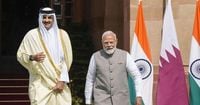On September 11, 2025, the relationship between India and Qatar took center stage in international affairs, as Prime Minister Narendra Modi and Sheikh Tamim Bin Hamad Al-Thani, the Amir of Qatar, reaffirmed their commitment to strengthening their strategic partnership. This high-level conversation came amid heightened regional tensions following Israeli airstrikes in Doha that targeted Hamas leaders, a move that drew widespread condemnation and underscored the delicate balance of diplomacy in the Gulf region.
According to ANI and Business Standard, both leaders expressed satisfaction with the sustained growth of the India-Qatar Strategic Partnership, highlighting progress in trade, investment, and security cooperation. Their discussion was not merely ceremonial; it reflected a mutual desire to "advance bilateral cooperation across all fields of mutual interest" and a shared understanding of the importance of maintaining close contact as global uncertainties persist.
But the conversation was also shadowed by recent dramatic events. Just days earlier, Israeli airstrikes in Doha targeted top Hamas leaders residing in a residential neighborhood, as reported by CNN and The Tribune. The attack killed five Hamas members, though the negotiating delegation survived. The strikes represented a significant escalation, drawing in not just Israel and Hamas but also regional mediators and global powers. Qatar, long a key player in facilitating ceasefire talks in Gaza, found itself at the epicenter of a new diplomatic storm.
Prime Minister Modi did not mince words in his response. In a widely circulated post on X (formerly Twitter), he stated, "Spoke with Amir of Qatar Sheikh Tamim Bin Hamad Al-Thani and expressed deep concern at the attacks in Doha. India condemns the violation of the sovereignty of the brotherly State of Qatar. We support resolution of issues through dialogue and diplomacy, and avoiding escalation. India stands firmly in support of peace and stability in the region, and against terrorism in all its forms and manifestations." This message, echoed in official press statements, made clear India's position: a firm condemnation of the attack, a call for diplomatic solutions, and an unwavering stance against terrorism.
The Indian government’s reaction was not limited to diplomatic statements. Modi’s outreach to Sheikh Tamim underscored India’s support for Qatar’s sovereignty and its efforts to promote peace and stability in a region that has seen more than its fair share of conflict. Both leaders agreed to remain in close contact, signaling a readiness to work together through whatever challenges may arise.
Qatar’s leadership, for its part, expressed appreciation for India’s solidarity. Sheikh Tamim thanked Modi for his support during what he described as a challenging period, and acknowledged India’s ongoing efforts to promote peace in the region. The Amir’s gratitude was not just diplomatic politeness; it reflected a genuine sense of camaraderie between the two nations, particularly as Qatar navigates the fallout from an attack it described as a violation of its sovereignty and territorial integrity.
The Indian community in Qatar also made its voice heard. On September 10, the Indian Business and Professionals Council (IBPC) in Qatar issued a statement expressing "profound sorrow and condemn[ation]" of the attack. Thaha Muhammed Abdul Kareem, president of IBPC Qatar, said, "We stand in unwavering solidarity with the people and the visionary leadership of Qatar." He went on to highlight Qatar’s role as a beacon of peace and a welcoming home for expatriates, including the large Indian diaspora. The IBPC praised Qatar’s commitment to global peace and its exemplary mediation efforts in regional conflicts, emphasizing the community’s faith in Qatar’s resilience and ability to emerge stronger from adversity.
Behind the scenes, the diplomatic fallout from the Israeli strike in Doha was complex. The White House Press Secretary, Karoline Leavitt, claimed during a press briefing that the United States administration had informed the Qatari government of Israel’s impending strikes. However, Qatar vehemently denied this, with Majed Al Ansari, advisor to the Qatari Prime Minister and spokesperson for the Ministry of Foreign Affairs, stating, "The statements being circulated about Qatar being informed of the attack in advance are baseless. The call from a US official came during the sound of explosions caused by the Israeli attack in Doha."
Qatar’s Prime Minister, Sheikh Mohammed bin Abdulrahman bin Jassim Al-Thani, minced no words in his condemnation of the attack. At a news conference reported by CNN, he called Israel a "rogue player" and described the airstrike as "state terrorism." He also alleged that the United States contacted Qatar only ten minutes after the attack had started, and claimed that Israel used weapons specifically designed to evade radar detection—namely, US-made F-35I stealth aircraft. Israeli officials later confirmed that more than ten fighter jets were involved in the operation, underlining the scale and sophistication of the strike.
This incident has cast a spotlight on the broader role of Qatar in the Middle East. Long recognized as a mediator in the Gaza conflict, Qatar’s ability to facilitate dialogue and secure ceasefires has made it an indispensable player in regional diplomacy. As noted by the IBPC and echoed in Indian government statements, Qatar’s efforts to promote humanitarian aid and peace have earned it respect far beyond its borders.
For India, the episode has reaffirmed the value of its relationship with Qatar—not just in economic or security terms, but as a partner in the quest for regional stability. The Indian government’s emphasis on resolving disputes through dialogue and diplomacy, and its condemnation of any violation of sovereignty, align with its broader foreign policy principles. By standing with Qatar at a moment of crisis, India has sent a clear message about the kind of partnership it values: one rooted in respect, mutual support, and a shared commitment to peace.
As the dust settles from the events in Doha, the ties between India and Qatar appear stronger than ever. Both governments, supported by their business communities and expatriate populations, have reiterated their dedication to deepening cooperation across all fields. In a region often marked by division and conflict, the India-Qatar partnership stands out as a beacon of dialogue, diplomacy, and resilience.
With the world watching, the next chapter in India-Qatar relations will likely be shaped by how both nations navigate these turbulent waters together—championing peace, prosperity, and the enduring bonds of friendship.


